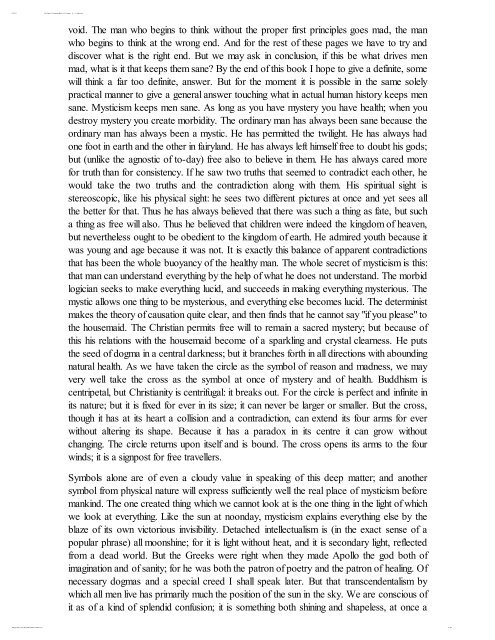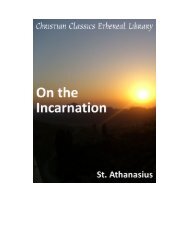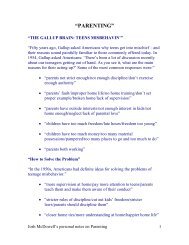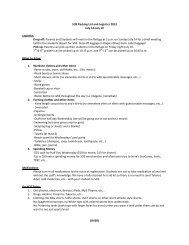Pdf Copy of Orthodoxy, by G.K. Chesterton - Christ United Methodist ...
Pdf Copy of Orthodoxy, by G.K. Chesterton - Christ United Methodist ...
Pdf Copy of Orthodoxy, by G.K. Chesterton - Christ United Methodist ...
Create successful ePaper yourself
Turn your PDF publications into a flip-book with our unique Google optimized e-Paper software.
9/ 27/ 12 The Pr oject G ut enber g eBook <strong>of</strong> O r t hodoxy, G . K. Chest er t on<br />
www. gut enber g. or g/ f iles/ 16769/ 16769- h/ 16769- h. ht m<br />
void. The man who begins to think without the proper first principles goes mad, the man<br />
who begins to think at the wrong end. And for the rest <strong>of</strong> these pages we have to try and<br />
discover what is the right end. But we may ask in conclusion, if this be what drives men<br />
mad, what is it that keeps them sane? By the end <strong>of</strong> this book I hope to give a definite, some<br />
will think a far too definite, answer. But for the moment it is possible in the same solely<br />
practical manner to give a general answer touching what in actual human history keeps men<br />
sane. Mysticism keeps men sane. As long as you have mystery you have health; when you<br />
destroy mystery you create morbidity. The ordinary man has always been sane because the<br />
ordinary man has always been a mystic. He has permitted the twilight. He has always had<br />
one foot in earth and the other in fairyland. He has always left himself free to doubt his gods;<br />
but (unlike the agnostic <strong>of</strong> to-day) free also to believe in them. He has always cared more<br />
for truth than for consistency. If he saw two truths that seemed to contradict each other, he<br />
would take the two truths and the contradiction along with them. His spiritual sight is<br />
stereoscopic, like his physical sight: he sees two different pictures at once and yet sees all<br />
the better for that. Thus he has always believed that there was such a thing as fate, but such<br />
a thing as free will also. Thus he believed that children were indeed the kingdom <strong>of</strong> heaven,<br />
but nevertheless ought to be obedient to the kingdom <strong>of</strong> earth. He admired youth because it<br />
was young and age because it was not. It is exactly this balance <strong>of</strong> apparent contradictions<br />
that has been the whole buoyancy <strong>of</strong> the healthy man. The whole secret <strong>of</strong> mysticism is this:<br />
that man can understand everything <strong>by</strong> the help <strong>of</strong> what he does not understand. The morbid<br />
logician seeks to make everything lucid, and succeeds in making everything mysterious. The<br />
mystic allows one thing to be mysterious, and everything else becomes lucid. The determinist<br />
makes the theory <strong>of</strong> causation quite clear, and then finds that he cannot say "if you please" to<br />
the housemaid. The <strong>Christ</strong>ian permits free will to remain a sacred mystery; but because <strong>of</strong><br />
this his relations with the housemaid become <strong>of</strong> a sparkling and crystal clearness. He puts<br />
the seed <strong>of</strong> dogma in a central darkness; but it branches forth in all directions with abounding<br />
natural health. As we have taken the circle as the symbol <strong>of</strong> reason and madness, we may<br />
very well take the cross as the symbol at once <strong>of</strong> mystery and <strong>of</strong> health. Buddhism is<br />
centripetal, but <strong>Christ</strong>ianity is centrifugal: it breaks out. For the circle is perfect and infinite in<br />
its nature; but it is fixed for ever in its size; it can never be larger or smaller. But the cross,<br />
though it has at its heart a collision and a contradiction, can extend its four arms for ever<br />
without altering its shape. Because it has a paradox in its centre it can grow without<br />
changing. The circle returns upon itself and is bound. The cross opens its arms to the four<br />
winds; it is a signpost for free travellers.<br />
Symbols alone are <strong>of</strong> even a cloudy value in speaking <strong>of</strong> this deep matter; and another<br />
symbol from physical nature will express sufficiently well the real place <strong>of</strong> mysticism before<br />
mankind. The one created thing which we cannot look at is the one thing in the light <strong>of</strong> which<br />
we look at everything. Like the sun at noonday, mysticism explains everything else <strong>by</strong> the<br />
blaze <strong>of</strong> its own victorious invisibility. Detached intellectualism is (in the exact sense <strong>of</strong> a<br />
popular phrase) all moonshine; for it is light without heat, and it is secondary light, reflected<br />
from a dead world. But the Greeks were right when they made Apollo the god both <strong>of</strong><br />
imagination and <strong>of</strong> sanity; for he was both the patron <strong>of</strong> poetry and the patron <strong>of</strong> healing. Of<br />
necessary dogmas and a special creed I shall speak later. But that transcendentalism <strong>by</strong><br />
which all men live has primarily much the position <strong>of</strong> the sun in the sky. We are conscious <strong>of</strong><br />
it as <strong>of</strong> a kind <strong>of</strong> splendid confusion; it is something both shining and shapeless, at once a<br />
14/ 100





